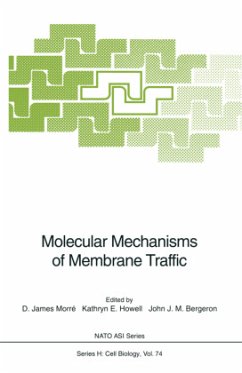
Dynamic Analysis of Enzyme Systems
An Introduction
Versandkostenfrei!
Versandfertig in 1-2 Wochen
39,99 €
inkl. MwSt.

PAYBACK Punkte
20 °P sammeln!
This book is concerned with a quantitative analysis of dynamic behavior of various enzymatic reaction systems by computer simulation. The authors and coworkers have been engaged in cooperative research since 1975, seeking to clarify the catalytic and regulatory characteristics of enzymatic reactions in vivo and control mechanisms suitable for enzyme technology. Rather than "enzyme kinetics" generally known in enzymol· ogy, this research has employed an approach called "enzyme dynamics" which concentrates on the exact schematic representation of an actual reac tion mechanism, derivation of rat...
This book is concerned with a quantitative analysis of dynamic behavior of various enzymatic reaction systems by computer simulation. The authors and coworkers have been engaged in cooperative research since 1975, seeking to clarify the catalytic and regulatory characteristics of enzymatic reactions in vivo and control mechanisms suitable for enzyme technology. Rather than "enzyme kinetics" generally known in enzymol· ogy, this research has employed an approach called "enzyme dynamics" which concentrates on the exact schematic representation of an actual reac tion mechanism, derivation of rate equation on the basis of the scheme, and computer simulation of its dynamic behavior (numerical solution of the rate equation and explanation of kinetic and regulatory properties of the enzymatic reaction). A rate equation representing the behavior of enzymatic reactions is gen erally expressed by a set of nonlinear differential equations. The analytic solution of rate equations is therefore impossible in general, making it necessary to introduce some approximations in order to analyze the exper· imental data in enzyme kinetics. For example, under an assumption of excess substrate against enzyme in a closed system, we commonly use the linear approximation for the early period of reaction, the quasi-steady state approximation based on putative maintenance of steady state in en zyme species, and the rapid-equilibrium approximation assuming instantane ous equilibration in complex formation and between complexes. The kinetic characteristics obtained by these approximations do not always reflect the dynamic behavior of actual enzymatic reactions.












